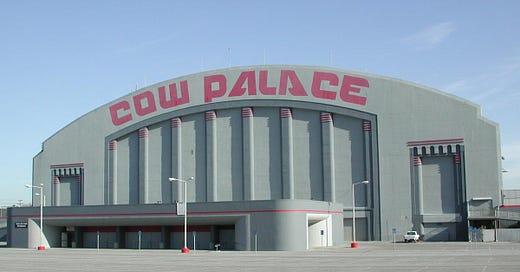SET 1: Frankenstein, NICU, Cars Trucks Buses, Character Zero > Divided Sky, Bathtub Gin, Life on Mars?, Maze, Suzy Greenberg
SET 2: Wilson > Simple -> Sparks > Sparkle > Taste > Swept Away > Steep > You Enjoy Myself, Waste > Harry Hood
ENCORE: Sample in a Jar
I’ve been pretty hard on Phish over the course of this tour. But I’m not really sweating it, because it received tough reviews from some Phish critics whom I give a lot of credit: Phish themselves. Richard Gehr’s The Phish Book, with exquisite timing, followed the band from roughly New Year’s Eve 1996 to New Year’s Eve 1997, capturing the band’s thoughts in the midst of their most important transition. And the first chapter of the book, pulled from conversations soon after NYE in Boston, throws plenty of shade at the tour they had just completed.
Page: “During the Fall 1996 tour, we left the East Coast but continued to play big arenas that were progressively less full as we traveled further outside our usual circuit. In response, we ended up playing with even more conviction, working harder, and taking more chances* in order to harness the sort of energy level that comes automatically at a sold-out arena show. It was an interesting tour that went on a little longer than it might have.”
Trey: “During 1996 we were really trying to get to this kind of music we were hearing in our heads, a way of playing where everybody was an equal part of a grid. At the same time we were going through transitional external changes, like adjusting to bigger rooms. Eventually, it all came together when we stopped trying so hard.”
Trey (again): “We’d been imagining a different kind of music even before this show, and were already changing in our heads. I remember West Coast shows before the New Year’s show that suggested how our ideas about what the band could be had already preceded our ability to do it. So we were still relying on our old bag of tricks to get us through some of these gigs.”
If the themes of my essays the last couple months line up suspiciously well with the band’s own takes, well, that’s less a credit to my observational skills than a lingering side effect of having read The Phish Book 200 times in 1998. But it’s valuable having Phish on the record about the shortcomings of 1996, very close to the moment. It’s easy to say with 25 years of hindsight that Phish were on the precipice of a breakthrough, much more impressive for them to have that self-assessment before the transformation had fully played out.
Tonight in the famously infamous Cow Palace embodies all of what Page and Trey described. It’s a totally fine show, with some superb playing in Gin, Simple, Taste, YEM, and Hood. It’s a solid setlist, with good flow and three of my favorite Phish covers. But it’s lacking the thrill of the new, and it all sounds somewhat methodical — not scripted, but like a band that has found a surefire strategy for producing a superlative arena-rock experience, executing that plan between the lines.
On Black Friday, the Cow Palace was sold out — you can rely on the SF hippies to show up — but the band is still following Page’s instructions up top: playing hard, and dialing up the energy. But they’re doing so with, as Trey says, their “old bag of tricks.” It’s best symbolized by the brief return of Sparks, which caps a Simple jam with its first appearance since 1994. I am a sucker for Sparks and all things Tommy, but Phish looking to The Who for inspiration is so last year. The band may have thought so too; the song didn’t return until summoned by The S Show in 2011.
As for “playing where everybody was an equal part of a grid,” there are flashes, most notably in YEM, one of the fall’s most fertile laboratories for the 1997 sound. Phish.net describes it as “odd jamming,” due to Trey breaking a string, but it’s pretty standard 1996 stuff, with a nice sparse breakdown, hints of “Spooky,” and a big twirly Trey peak stretching it out to a luxurious 28 minutes. It’s quite good, but by now they’ve repeatedly proven they can do a strong funk jam in a song that has had “funk jam” practically written into its notation since the early 90’s; it’s past time for the style to spread to new hosts.
These gripes would be classic Phish fan entitlement, but the band’s own dissatisfaction grants a reprieve. In the mid-90s, when post-show band discussions were still allowed, nobody held Phish to a higher standard than themselves. I’m pretty sure the band felt the need for change more than the fans; I’ve heard from plenty of readers who had a grand old time at Fall 96 shows I’ve brushed off as mediocre, and no less a jaded vet than Charlie Dirksen found plenty to love in this seemingly unremarkable night at the Cow Palace. They likely could have spent another couple years slowly iterating on their arena-rock phase, but as they told Gehr in early 1997, they decided to punch the accelerator instead.
* - They’re not always reliable narrators.




